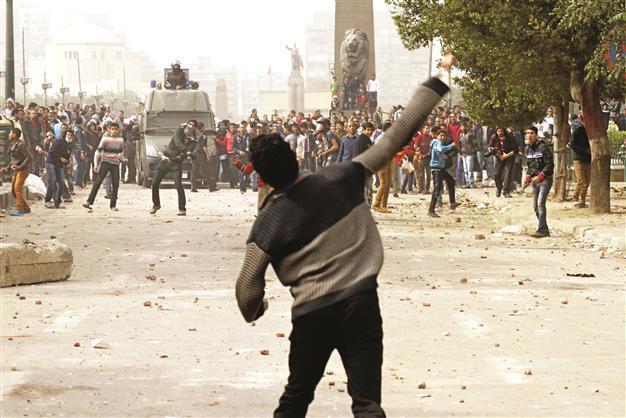Leaked Port Said report puts police in firing line
James M. Dorsey ISTANBUL - Hürriyet Daily News

AFP Photo
Egypt’s premier football league is scheduled to resume this weekend for the first time in a year amid security concerns against the backdrop of violent anti-government protests and the leaking of a court report that holds the police, as well as fans, responsible for last year’s death of 74 people in a politically loaded brawl in the Suez Canal city of Port Said.
With matches initially scheduled to be played behind closed doors in military stadiums, security concerns have been fueled by the deaths of at least 60 people in anti-government protests in the last week, militant fan opposition to resumption of the league, the exclusion of spectators from matches and criticism of the Egyptian Football Association’s (EFA) failure to upgrade stadium security.
The leaking of a 200-page summary of the prosecution’s case obtained by McClatchy Newspapers in the trial against 73 defendants – including nine mid-level security officials – who are accused of responsibility for the death of 74 soccer fans in Port Said is certain to fuel demands by militant soccer fans that the league only be resumed once justice has been served.
The initial death sentences issued to 21 supporters of Port Said’s Al Masri Sports Club sparked violent protests in the city that left 32 people dead and some 300 wounded. The court, which did not publish the reasoning behind its verdict, said it would announce its verdict in the case of the remaining 52 defendants, including the security officials, on March 9.
The postponement of the sentencing of the security officials coupled with the leaked report reinforce perceptions that the government of Mr. Morsi, like its military predecessor, is reluctant to hold the country’s despised police and security forces responsible for the deaths of more than 800 protesters since mass protests erupted two years ago, forcing President Hosni Mubarak to resign after 30 years in office.
The Port Said incident is widely seen as an attempt to punish militant, highly politicized, well-organized and street battle-hardened soccer fans for their key role in the toppling of Mr. Mubarak and their opposition to the military government that succeeded him and paved the way for the election of Mr. Morsi, a member of the Muslim Brotherhood.
The leaked prosecutor’s report, according to McClatchy, asserts that the police as well as Al Masri fans were responsible for the deaths of the Al Ahli fans. In doing so, it is likely to increase a sense in Port Said that it is being made a scapegoat despite the fact that Al Masri militants, or ultras, had also joined the protests that ended the Mubarak era.
It will also strengthen calls for reform of the police and security forces that were the repressive arm of the Mubarak regime and are, since Mr. Mubarak’s fall, a law unto themselves, according to a human rights report published last month.
The report said that police had failed to check fans entering the Port Said stadium for weapons on the day of the fatal match. It said that several Al Masri fans told investigators they’d noticed that one of the gates had been welded shut when they entered the stadium. They also thought it strange that no one was searching people for weapons.
The report – based on interviews with fans of both teams, reporters at the game, stadium lighting experts and police, as well as autopsy reports and videos – suggests that the Port Said brawl was planned at a meeting, two days before the match, of a support group called Super Green that was sanctioned by the club. The meeting was attended by some of the 21 fans sentenced to death, the report said. It noted further that militants of both Al Masri and Al Ahli had issued threats on social media in advance of the fatal match. “Port Said is waiting for you with knives and pistols,” one of the messages read, according to the report. “If you are coming to Port Said, write your mother a will because you will die for sure,” read another.
The report said that the Super Green meeting was designed to plan an attack on Al Ahli fans. It said the meeting was headed by Mohammed Adel Mohammed, a 21-year-old ultra known by his nickname, Hummus. Hummus is among those now on death row and has become the symbol of the Port Said protests, with calls for his release painted on the exterior of Port Said’s stadium.
“Defendants premeditated the killing of some of the Ahly club fans (ultras) to retaliate for previous disputes between them and to show off their strength. For this purpose, they used weapons (knives and sticks) and explosive materials, such as flames, and rocks and other items to assault people,” the report said.
A police officer known as “Defendant 70” had the keys to all the gates but couldn’t be found when the stampede began, the report said, claiming that he offered different explanations for his disappearance.
At one point, he said he didn’t unlock the gate at the request of “Defendant 64,” another officer. He told someone else the crowds were too big for him to confront. “Defendant 64” has claimed he never gave such orders and couldn’t find his fellow officer when the attack began, the report said.
This weekend’s resumption of soccer for the first time since the Port Said incident a year ago could hardly occur under less-propitious circumstances. In addition to the prosecutor’s report putting the police even more in the firing line, analysts question whether security is sufficient to prevent a similar incident from happening again even though military stadiums are believed to be the most secure in Egypt.
